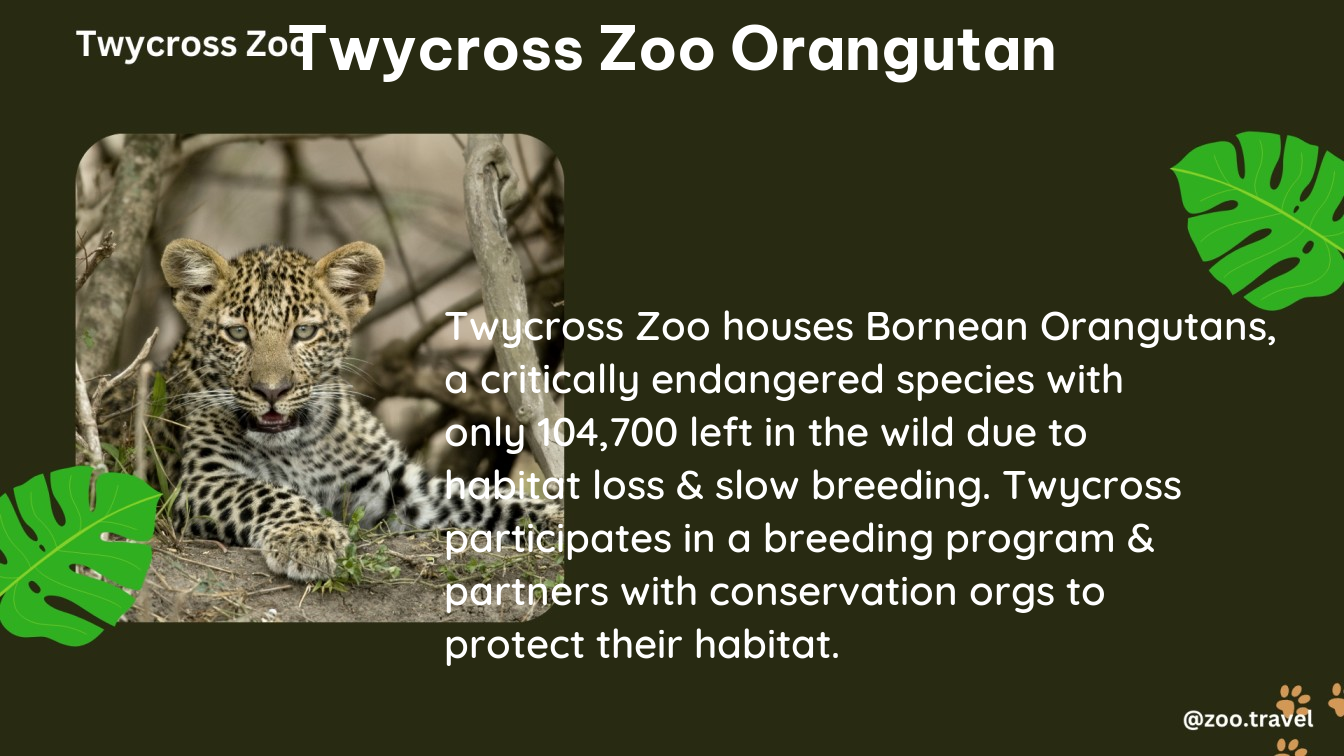Twycross Zoo, located in Leicestershire, England, is home to a family of Bornean orangutans. These great apes are known for their distinctive red hair, intelligence, and arboreal lifestyle. Twycross Zoo supports conservation education programs, such as the Borneo Nature Foundation’s conservation education initiatives, which aim to provide children with an appreciation for nature and the knowledge and tools to facilitate future change.
Orangutan Characteristics
Orangutans are one of the four great apes, sharing 96.4% of human genes. They are native to Sumatra and Borneo and are the largest arboreal mammal, spending most of their time in trees. Their long, powerful arms and grasping hands and feet allow them to move through the branches easily. Orangutans are frugivores, mainly eating fruit, and play a key role in keeping rainforests healthy by dispersing seeds.
Twycross Zoo Orangutans

Twycross Zoo is home to five Bornean orangutans: Batu (31 years old, male), Kibriah (43 years old, female), Maliku (26 years old, female), Kayan (3 years old, female, offspring to Kibriah and Batu), and Basuki (3 years old, male, offspring to Maliku and Batu).
| Name | Age | Sex |
|---|---|---|
| Batu | 31 | Male |
| Kibriah | 43 | Female |
| Maliku | 26 | Female |
| Kayan | 3 | Female |
| Basuki | 3 | Male |
Conservation Efforts
Twycross Zoo is actively involved in conservation efforts for orangutans. The zoo participates in the European Ex-situ Breeding Programme (EEP) for Bornean orangutans, working closely with other zoos to create a healthy captive population that could be used if the wild population ever goes extinct. Twycross Zoo is also a conservation partner of the Borneo Nature Foundation, which works on the ground in Borneo to protect key areas of tropical rainforest and safeguard wildlife and indigenous cultures.
Habitat Loss and Threats
Orangutans face significant threats, primarily due to habitat loss from deforestation for palm oil plantations. Palm oil is the most widely used vegetable oil in the world, found in products from shampoos and soaps to pizzas and biscuits. The demand for palm oil is increasing every year, leading to the clearing of rainforests for agriculture. To produce palm oil sustainably, it must be produced in a way that minimizes negative effects on the environment and local people.
Breeding Programme
Twycross Zoo’s breeding programme focuses on preserving the genetic diversity of the species and aims to conserve healthy animal populations in captivity. The iconic orangutan species faces an uncertain future in the wild, with population numbers steadily plummeting and experts estimating the species could face extinction in the next 20 years. Last year, the International Union for Conservation of Nature and Natural Resources (IUCN) changed the status of Bornean orangutans to Critically Endangered, recognizing the severity of the threats.
Supporting Twycross Zoo
Visitors to Twycross Zoo can support the conservation of endangered species by purchasing items from the zoo’s Amazon Wishlist, which helps provide enrichment for animals and maintain their habitats. Donations to Twycross Zoo, a conservation charity, support the care and conservation of the animals at the zoo.
References
- Twycross Zoo. (2023). It’s official! Our ‘orang utan characteristics’ helped us through lockdown! https://twycrosszoo.org/latest-news/it-s-official-our-orang-utan-characteristics-helped-us-through-lockdown/
- Twycross Zoo. (n.d.). Bornean Orangutan. https://twycrosszoo.org/explore/animals/bornean-orangutan/
- Twycross Zoo. (2021). Twycross Zoo mourns beloved orangutan Kibriah. https://www.bbc.com/news/uk-england-leicestershire-58677646
- Twycross Zoo. (n.d.). Animals at Twycross Zoo. https://twycrosszoo.org/explore/animals/
- Twycross Zoo. (n.d.). Second Bornean Orangutan Born at Twycross Zoo. https://twycrosszoo.org/latest-news/second-bornean-orangutan-born-at-twycross-zoo/
